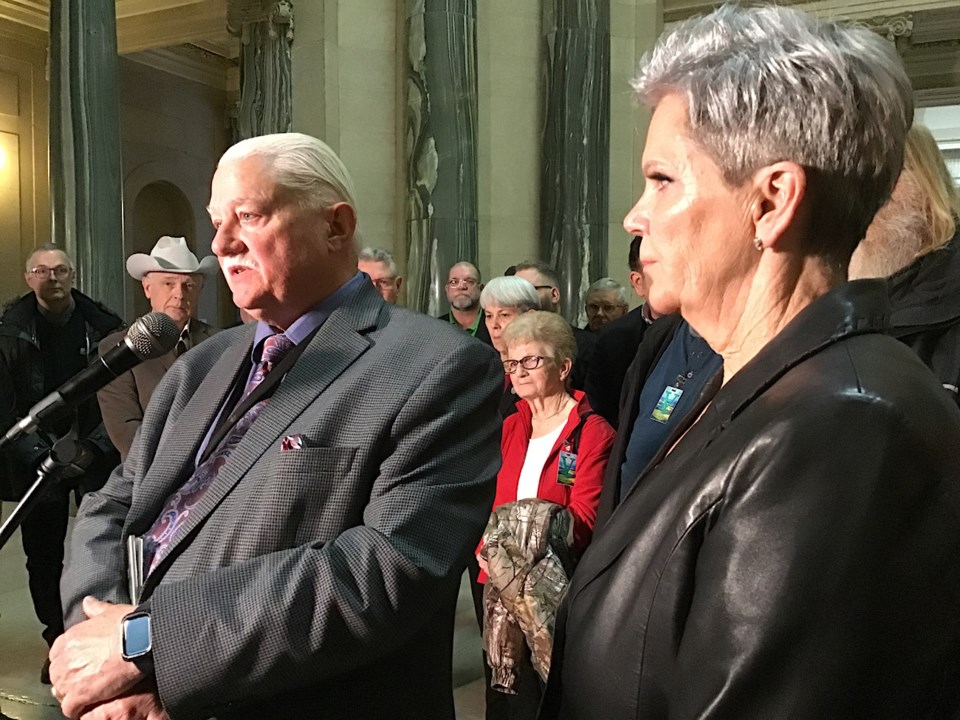REGINA - On the final sitting day before the Easter break, the Saskatchewan Firearms Act passed final reading at the legislature Thursday and is now law.
The Act passed third reading unanimously 45-0 with all members present voting in favor.
This is the provincial legislation aimed at putting some checks and balances in ahead of the federal government’s firearm buyback program, which is aimed at buying back “assault-style” rifles and removing them from the market.
The concern from firearms owners in Saskatchewan is that the federal buyback is too broad, and that their own hunting and shooting rifles may be targeted and confiscated. The provincial legislation passed Thursday puts in a number of requirements that will need to be followed.
Under the provincial Act passed on Thursday, it will see Saskatchewan bring in licensing requirements for seizure agents (ie. police, RCMP) involved in firearms expropriation; to require and oversee fair compensation for any firearms being seized; and to require forensic and ballistic testing of seized firearms.
The Act will also establish a provincial firearms regulatory system that will promote the safe and responsible use of firearms. The legislation will primarily by administered by the Saskatchewan Firearms Office, which will see an expanded role prosecuting non-violent provincial firearms offenses.
There were amendments brought forward and approved in committee following second reading. According to Minister Tell, the amendment specifically had to do with seizure agents, where “police acting on behalf of another agent, or the federal government in order to confiscate firearms, will have to receive a license. They have to be licensed as well.”
“That is not to say that police in the normal course of their duties functioning as part of a police service, that they can’t confiscate or receive a firearm in the course of their normal duties. What we are saying, is very specific and proscriptive that if they are confiscating a firearm, and they’re acting on behalf of the agent or acting on behalf of the federal government confiscating the firearm, that they must get licensed.”
There is also a requirement that if municipal police forces want to take part in the federal buyback program they need approval from the provincial Minister.
“Again, that is not their function. Police are there to perform a number of functions in their communities. This would be on the request on the behalf of the agent of the federal government to expropriate firearms from lawful firearms orders. So we are saying that permission from the minister must be obtained.”
When Tell was asked whether the provincial minister would grant that permission: “I guess it would depend on the circumstances, but not likely.”
When asked to expand on that, Tell said “if they are performing that specific function to expropriate firearms from lawful firearms owners at the request or behest of the federal government or another agent, I probably will not grant that permission… Every circumstance is different.”
As for the firearms the province is seeking to prevent the federal government from seizing, Chief Firearms Officer Robert Freberg explained to reporters the federal government was using the term “assault-style firearms” as a catchall.
“I just want people to understand that the term ‘assault-style firearms’ is being used, frankly in my opinion as an expert, it is a bit of sensationalism. A lot of those firearms certainly never had any military origin.”
Freberg said as someone in the industry for 50 years, “I look at some of these firearms. I have no idea how they got on the list. Again, that’s one of the reasons why we’re bringing this legislation forward, and we’re studying it and we’re also building on the ballistics labs to get forensic experts and so forth to come in and do some really good analysis on these firearms, because I’m not certain how this came up. They were listed as non-restricted when they were first being allowed to be sold to Canadians, and then all of a sudden we had an incident that was caused from smuggled firearms and an illegal firearms owner that never had a license, and then overnight these guns changed from being unrestricted to prohibited. So how they jumped three categories in a few hours — the guns didn’t change, so obviously the interpretation did.”
Both Tell and Freberg were joined at the legislature by several supporters of the legislation from various groups.
While the New Democrats joined the government MLAs in favor of the Act only five of their MLAs were present for the final standing vote; seven others including Opposition Leader Carla Beck were not present.
Opposition critic Trent Wotherspoon made it clear to reporters his party was supportive of the Act.
“We stood in support of the Act, we stood united in this Assembly in the past as well against some of the overreach of the federal government. I think today with respect to the Act we stood in support of common sense measures to ensure some fairness for gun owners in Saskatchewan.”
The Sask. Firearms Act was one of several bills that Lieutenant Governor Russ Mirasty gave Royal Assent to on Thursday; among the others also receiving Royal Assent was the Sask. First Act.




